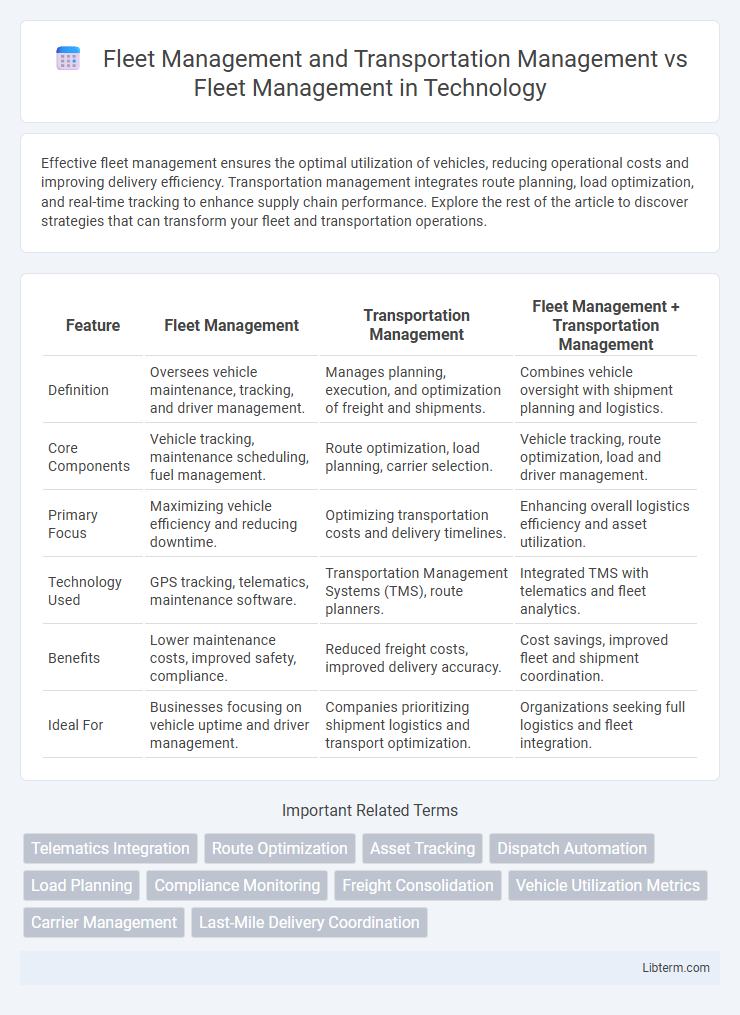Effective fleet management ensures the optimal utilization of vehicles, reducing operational costs and improving delivery efficiency. Transportation management integrates route planning, load optimization, and real-time tracking to enhance supply chain performance. Explore the rest of the article to discover strategies that can transform your fleet and transportation operations.
Table of Comparison
| Feature | Fleet Management | Transportation Management | Fleet Management + Transportation Management |
|---|---|---|---|
| Definition | Oversees vehicle maintenance, tracking, and driver management. | Manages planning, execution, and optimization of freight and shipments. | Combines vehicle oversight with shipment planning and logistics. |
| Core Components | Vehicle tracking, maintenance scheduling, fuel management. | Route optimization, load planning, carrier selection. | Vehicle tracking, route optimization, load and driver management. |
| Primary Focus | Maximizing vehicle efficiency and reducing downtime. | Optimizing transportation costs and delivery timelines. | Enhancing overall logistics efficiency and asset utilization. |
| Technology Used | GPS tracking, telematics, maintenance software. | Transportation Management Systems (TMS), route planners. | Integrated TMS with telematics and fleet analytics. |
| Benefits | Lower maintenance costs, improved safety, compliance. | Reduced freight costs, improved delivery accuracy. | Cost savings, improved fleet and shipment coordination. |
| Ideal For | Businesses focusing on vehicle uptime and driver management. | Companies prioritizing shipment logistics and transport optimization. | Organizations seeking full logistics and fleet integration. |
Overview of Fleet Management
Fleet Management encompasses the comprehensive administration of company vehicles, including maintenance, fuel management, driver performance, and compliance with regulations to optimize operational efficiency and reduce costs. Transportation Management focuses specifically on planning, executing, and optimizing the physical movement of goods, emphasizing route planning, shipment tracking, and carrier selection. Understanding the core functions of Fleet Management is essential for businesses aiming to enhance vehicle utilization while ensuring safety and regulatory adherence across their entire fleet.
What is Transportation Management?
Transportation Management involves planning, executing, and optimizing the physical movement of goods, focusing on route planning, carrier selection, freight auditing, and shipment tracking. Fleet Management centers on the maintenance, tracking, and operation of company vehicles, emphasizing vehicle diagnostics, fuel management, and driver performance. While both are critical components of supply chain logistics, Transportation Management prioritizes the strategic coordination of shipments across various carriers and modes, differentiating it from the operational focus of Fleet Management.
Comparing Fleet Management vs Transportation Management
Fleet Management primarily concentrates on the operational aspects of a company's vehicle fleet, including vehicle acquisition, maintenance, fuel management, driver administration, and compliance with safety regulations. Transportation Management extends beyond fleet operations to optimize the planning, execution, and tracking of freight movements, incorporating route optimization, carrier selection, load planning, and supply chain visibility. While Fleet Management ensures the efficiency and longevity of vehicles, Transportation Management strategically coordinates logistics to enhance delivery speed, cost-efficiency, and customer satisfaction.
Key Components of Fleet Management
Fleet management involves the integration of vehicle acquisition, maintenance scheduling, telematics tracking, fuel management, and driver safety protocols to optimize operational efficiency and reduce costs. Transportation management specifically centers on route planning, freight allocation, load optimization, and compliance with transportation regulations to enhance delivery performance. Key components distinguishing fleet management include comprehensive asset lifecycle management, predictive maintenance analytics, and advanced driver behavior monitoring systems.
Core Functions of Transportation Management
Transportation management focuses on optimizing the movement of goods through route planning, carrier selection, and freight auditing, ensuring cost-efficiency and timely delivery. Core functions include load optimization, shipment tracking, and regulatory compliance, which coordinate the entire supply chain process from origin to destination. Unlike broader fleet management, which emphasizes vehicle maintenance and driver management, transportation management centers on logistics, freight cost control, and service level optimization.
Overlapping Features Between Fleet and Transportation Management
Fleet management and transportation management both involve optimizing vehicle utilization, route planning, and maintenance scheduling to enhance operational efficiency. Overlapping features include real-time tracking of vehicles, driver performance monitoring, fuel consumption analysis, and compliance with regulatory requirements. These shared capabilities ensure improved logistics coordination, cost control, and timely delivery across both management systems.
Distinct Benefits of Fleet Management Systems
Fleet Management Systems provide distinct benefits that extend beyond traditional Fleet Management and Transportation Management by integrating real-time vehicle tracking, maintenance scheduling, and driver behavior analysis to optimize operational efficiency. These systems reduce fuel consumption and operational costs through data-driven route optimization and predictive maintenance alerts, enhancing fleet longevity and safety. Enhanced compliance with regulatory standards and improved asset utilization are additional advantages, distinguishing Fleet Management Systems as essential tools for modern logistics and transportation operations.
Unique Advantages of Transportation Management Systems
Transportation Management Systems (TMS) offer unique advantages in optimizing route planning, real-time shipment tracking, and freight cost reduction compared to traditional Fleet Management. TMS integrates advanced analytics and carrier selection tools, enhancing delivery efficiency and customer service levels while improving supply chain visibility. These features enable companies to make data-driven decisions, reduce transportation expenses, and adapt quickly to changing logistics demands.
Choosing the Right Solution for Your Business Needs
Choosing the right solution between Fleet Management and Transportation Management hinges on your business's operational scope and objectives. Fleet Management focuses on optimizing vehicle maintenance, fuel consumption, and driver performance, while Transportation Management offers broader control over logistics, route planning, and freight cost reduction. Assessing factors like fleet size, delivery complexity, and integration capabilities ensures selecting a system that enhances efficiency and aligns with strategic goals.
Future Trends in Fleet and Transportation Management
Future trends in fleet and transportation management emphasize the integration of advanced telematics, AI-driven route optimization, and predictive maintenance to enhance operational efficiency and reduce costs. Emerging technologies such as autonomous vehicles and electric fleets are poised to revolutionize fleet operations by minimizing environmental impact and improving safety standards. Data analytics and IoT connectivity enable real-time decision-making and dynamic resource allocation, positioning comprehensive transportation management as essential for competitive fleet performance.
Fleet Management and Transportation Management Infographic

 libterm.com
libterm.com